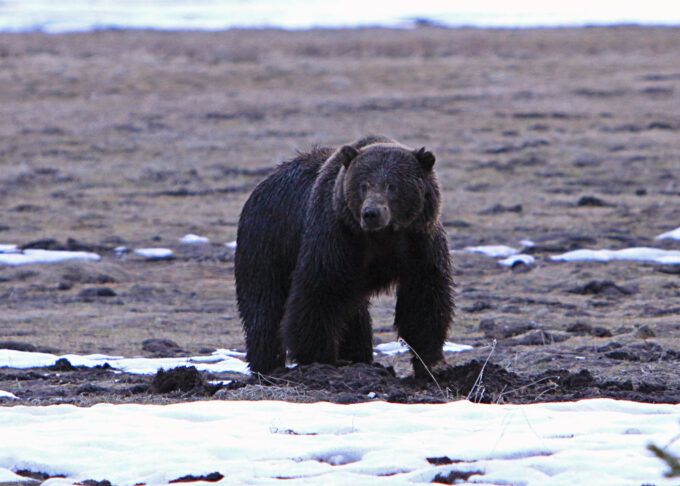Grizzly Hunting is Trophy Hunting

Grizzly bear north of Obsidian Cliff, Yellowstone. Photo: Jim Peaco, National Park Service.
A final decision on the petitions to remove the grizzly bear from the list of threatened species and the protections of the Endangered Species Act (delisting) may come in June or early July. Currently, authority over grizzly bear management is vested in the U.S. Fish & Wildlife Service. If the petitions are approved, management will be turned over to the states.
Both Montana and Wyoming would have trophy hunts for grizzly bears. Wyoming would begin immediately and Montana in five years. But what would stop the politicians once they’ve achieved control over the bears?
Keep in mind that all grizzly bear hunting is trophy hunting. There is no subsistence hunting for bears in the lower 48. People do not eat bear meat and Montana hunting regulations do not require black bear hunters to eat the meat. To the contrary, hunters of elk, deer and other species can be fined if they waste the meat. Grizzly bear hunting is for the trophy and the thrill of shooting a grizzly bear.
Montana might use private citizens to remove bears with a history of management or habituation. This is not hunting. Since most bears with a management history are radio-collared, hunters might be directed to the bear’s location. This is not ethical or fair chase nor would it be allowed for any other animal.
The states also intend to arbitrarily limit where grizzly bears may be, even where they are in excellent habitat on public lands such as the Missouri Breaks with over one million acres of public lands and Wilderness. Hunting tags may be issued in specific areas to limit grizzly bear distribution to Wilderness and National Parks, which are not large enough to support viable populations. It’s the antithesis of wildlife habitat connectivity.
Montana Fish, Wildlife & Parks (FWPs) earned a reputation as being the leading state wildlife management agency in the U.S. and has been highly trusted by the public. Unfortunately, political interference is tarnishing this reputation. The Montana Fish & Wildlife Commission used to have professional biologists as members including Chairs Dr. Gary Wolf and Dr. Bob Ream. No more. There is not a single biologist on the Commission, whose members are all appointed by the Governor.
Moreover, the legislature enacted many laws governing wildlife management that retired FWPs biologists and others have warned are extreme, unsporting and threaten stable populations of wildlife. This pervasive influence led FWPs to produce a statewide management plan for grizzly bears that reads like a trophy hunting plan. Many justifications are offered for trophy hunting grizzly bears, but few if any for not doing it.
The political override of state biologists is affecting Montana’s wildlife heritage from elk on down the line. In Wyoming the Cody Roberts wolf torture episode, which Wyoming Fish & Game sat on for five weeks, further erodes confidence in state management of carnivores and predators. Trust must be re-earned and that takes time.
If you oppose the trophy hunting of grizzly bears then you must also oppose removing the grizzly bear from the protections of the Endangered Species Act because that would immediately enable unsustainable trophy hunting. Relisting a species is almost unheard of and takes much time that the grizzly bear does not have.
There is no ordinary hunting of grizzly bears. It is trophy hunting plain and simple. Please consider contacting the U.S. Fish & Wildlife Service and tell them no delisting and no trophy hunting of grizzly bears. In the Search box, enter FWS-R6-ES-2022-0150, which is the docket number for this action.
No comments:
Post a Comment